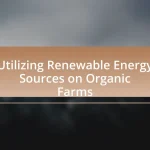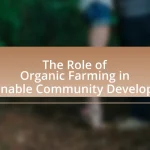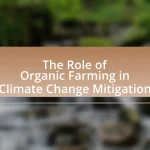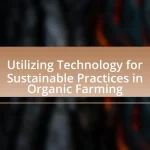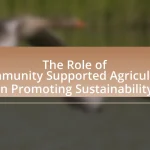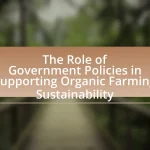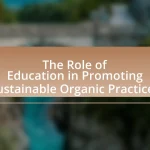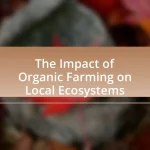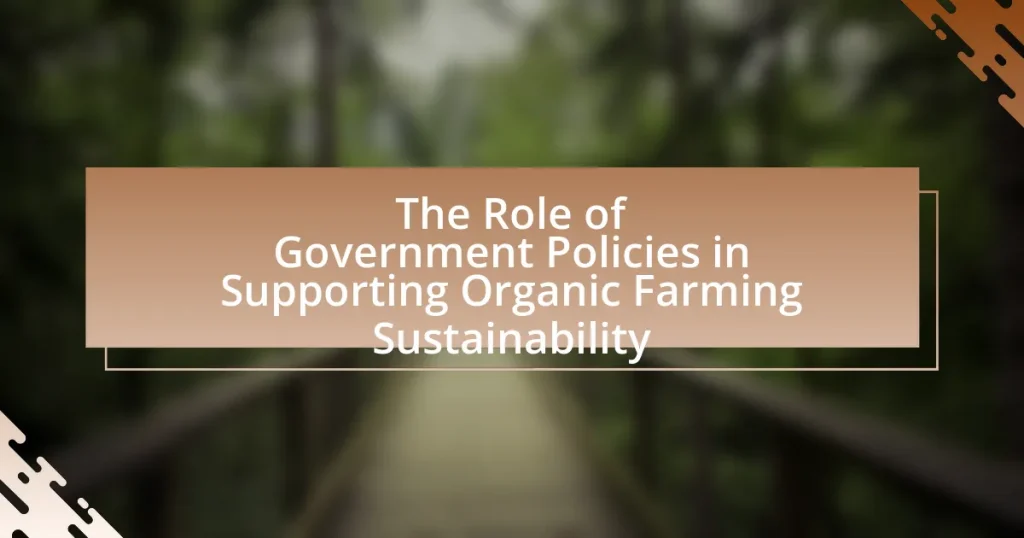The article examines the critical role of government policies in promoting the sustainability of organic farming. It highlights how financial incentives, regulatory frameworks, and educational resources support farmers in adopting organic practices, ultimately enhancing soil health and biodiversity. Key policies discussed include subsidies for organic certification, research initiatives, and consumer awareness programs, all of which contribute to the economic viability and growth of the organic farming sector. Additionally, the article addresses the challenges faced by organic farmers without government intervention and explores best practices for effective policy implementation.
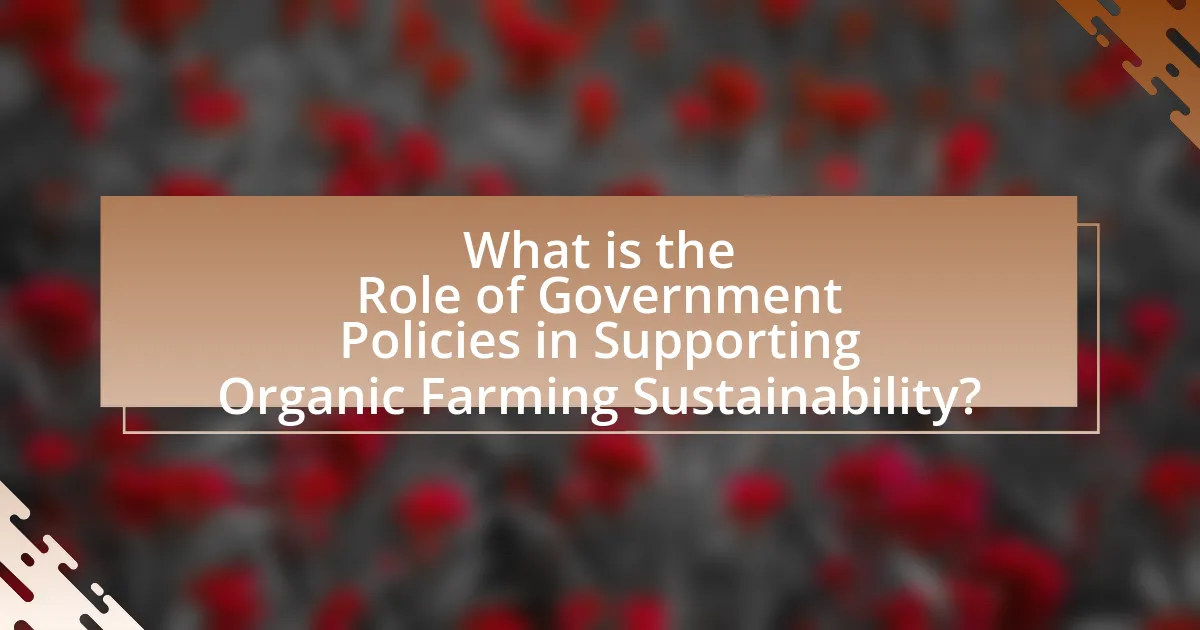
What is the Role of Government Policies in Supporting Organic Farming Sustainability?
Government policies play a crucial role in supporting organic farming sustainability by providing financial incentives, regulatory frameworks, and educational resources. These policies, such as subsidies for organic farmers and grants for sustainable practices, encourage the adoption of organic methods, which can lead to improved soil health and biodiversity. For instance, the USDA’s Organic Certification Program offers support that helps farmers transition to organic practices, thereby enhancing environmental sustainability. Additionally, policies that promote research and development in organic agriculture contribute to innovation and efficiency, further solidifying the sustainability of organic farming systems.
How do government policies influence organic farming practices?
Government policies significantly influence organic farming practices by establishing regulations, providing financial incentives, and promoting research and education. Regulations, such as the USDA’s National Organic Program, set standards for organic certification, ensuring that farmers adhere to specific practices that promote sustainability. Financial incentives, including grants and subsidies, encourage farmers to transition to organic methods by offsetting initial costs. Additionally, government-funded research initiatives, like those from the Organic Farming Research Foundation, support the development of innovative organic farming techniques, enhancing productivity and sustainability. These combined efforts create a supportive framework that fosters the growth of organic farming practices.
What specific policies are implemented to promote organic farming?
Specific policies implemented to promote organic farming include financial incentives, regulatory frameworks, and educational programs. Financial incentives, such as subsidies and grants, encourage farmers to transition to organic practices by offsetting initial costs. Regulatory frameworks establish standards for organic certification, ensuring product integrity and consumer trust. Educational programs provide training and resources to farmers on organic methods, enhancing their knowledge and skills. For instance, the USDA’s Organic Certification Program outlines specific guidelines and support for farmers seeking organic status, reinforcing the commitment to sustainable agricultural practices.
How do these policies impact farmers’ decisions to adopt organic methods?
Government policies significantly influence farmers’ decisions to adopt organic methods by providing financial incentives, technical support, and regulatory frameworks that promote organic practices. For instance, subsidies for organic certification and grants for transitioning to organic farming reduce the economic burden on farmers, making organic methods more appealing. Additionally, policies that establish clear standards for organic farming help farmers understand the requirements and benefits of certification, thereby encouraging adoption. Research from the USDA shows that regions with supportive policies see a higher rate of organic adoption, with a 20% increase in certified organic farms in areas with active government support programs.
Why is government support crucial for organic farming sustainability?
Government support is crucial for organic farming sustainability because it provides essential resources, financial assistance, and regulatory frameworks that promote environmentally friendly practices. This support helps farmers transition to organic methods, which often require significant upfront investment and ongoing operational costs. For instance, the USDA’s Organic Certification Program offers financial assistance to farmers seeking organic certification, which can be a barrier for many. Additionally, government policies can incentivize sustainable practices through subsidies and grants, as seen in the European Union’s Common Agricultural Policy, which allocates funds specifically for organic farming initiatives. Such support not only enhances the economic viability of organic farms but also contributes to broader environmental goals, such as biodiversity conservation and soil health improvement.
What challenges do organic farmers face without government intervention?
Organic farmers face significant challenges without government intervention, primarily due to limited access to financial resources and market support. Without subsidies or grants, organic farmers often struggle to cover the higher costs associated with organic certification, pest management, and sustainable practices. For instance, a study by the USDA found that organic farming can require up to 30% more investment compared to conventional farming, making it difficult for farmers to compete in price-sensitive markets. Additionally, the absence of government-backed marketing programs can hinder organic farmers’ ability to reach consumers effectively, resulting in lower sales and reduced profitability.
How does government support enhance the economic viability of organic farming?
Government support enhances the economic viability of organic farming by providing financial assistance, subsidies, and technical resources that lower production costs and improve market access. For instance, programs like the USDA’s Organic Certification Cost Share Program reimburse farmers for certification expenses, making it more affordable to enter the organic market. Additionally, government-funded research initiatives, such as those from the National Institute of Food and Agriculture, offer farmers access to innovative practices and technologies that can increase yield and sustainability. These measures collectively contribute to a more robust organic farming sector, evidenced by a 2019 report from the Organic Trade Association indicating that organic sales reached $55.1 billion, highlighting the sector’s growth supported by effective government policies.
What are the key components of effective government policies for organic farming?
Effective government policies for organic farming include financial incentives, regulatory frameworks, research support, and education initiatives. Financial incentives, such as subsidies and grants, encourage farmers to transition to organic practices, as evidenced by the USDA’s Organic Certification Cost Share Program, which has helped thousands of farmers offset certification costs. Regulatory frameworks ensure compliance with organic standards, promoting consumer trust and market stability; for instance, the USDA’s National Organic Program sets clear guidelines for organic labeling. Research support fosters innovation in organic farming techniques, with funding allocated to studies that enhance productivity and sustainability. Education initiatives, such as training programs and workshops, equip farmers with the knowledge needed to implement organic practices effectively, as demonstrated by the success of extension services in various states. Together, these components create a comprehensive approach that supports the growth and sustainability of organic farming.
How do subsidies and financial incentives affect organic farming adoption?
Subsidies and financial incentives significantly enhance organic farming adoption by reducing the economic barriers faced by farmers. These financial supports can cover the initial costs of transitioning to organic practices, which often include investments in organic seeds, certification processes, and sustainable farming equipment. For instance, a study by the USDA found that farms receiving subsidies were 30% more likely to adopt organic practices compared to those without such financial assistance. This correlation indicates that targeted financial policies can effectively promote the shift towards organic farming, ultimately contributing to sustainable agricultural practices.
What role do regulations play in ensuring organic farming standards?
Regulations play a crucial role in ensuring organic farming standards by establishing clear guidelines that farmers must follow to maintain organic certification. These regulations, enforced by government bodies, dictate practices such as the prohibition of synthetic pesticides and fertilizers, the requirement for crop rotation, and the maintenance of soil health. For instance, the USDA’s National Organic Program (NOP) sets specific criteria that must be met for products to be labeled as organic, ensuring consistency and integrity in organic farming. This regulatory framework helps protect consumers from misleading claims and promotes sustainable agricultural practices, thereby supporting the overall sustainability of organic farming.
How do government policies promote consumer awareness of organic products?
Government policies promote consumer awareness of organic products through labeling regulations, educational campaigns, and financial incentives. Labeling regulations, such as the USDA Organic certification, provide consumers with clear information about organic products, helping them make informed choices. Educational campaigns funded by government initiatives, like the National Organic Program, raise awareness about the benefits of organic farming and consumption. Additionally, financial incentives, such as subsidies for organic farmers, indirectly enhance consumer awareness by increasing the availability and visibility of organic products in the market. These combined efforts create a more informed consumer base, leading to increased demand for organic products.
What initiatives are in place to educate consumers about organic farming benefits?
Government initiatives to educate consumers about organic farming benefits include programs like the USDA’s Organic Certification Program, which provides information on organic practices and their advantages. Additionally, the National Organic Program (NOP) offers resources and outreach efforts to raise awareness about organic farming’s environmental and health benefits. Research indicates that consumers who are informed about organic farming practices are more likely to support and purchase organic products, thereby enhancing market demand and sustainability.
How do labeling and certification programs influence consumer choices?
Labeling and certification programs significantly influence consumer choices by providing assurance of product quality and sustainability. These programs, such as USDA Organic or Fair Trade certifications, help consumers identify products that meet specific environmental and ethical standards. Research indicates that consumers are willing to pay a premium for certified products; for instance, a study published in the Journal of Consumer Research found that 66% of consumers prefer products with eco-labels, demonstrating a clear preference for transparency and trust in food sourcing. This consumer behavior is driven by the desire for healthier options and support for sustainable practices, ultimately shaping market trends and encouraging producers to adopt organic farming methods.
What are the potential drawbacks of government policies on organic farming?
Government policies on organic farming can lead to several potential drawbacks, including increased regulatory burdens and market distortions. These policies often impose strict certification requirements that can be costly and time-consuming for farmers, potentially discouraging small-scale producers from entering the organic market. Additionally, subsidies and incentives may favor larger agricultural operations, creating an uneven playing field that undermines the sustainability goals intended by such policies. Research from the USDA indicates that while government support can enhance organic farming, it can also inadvertently lead to dependency on subsidies, which may not be sustainable in the long term.
How can overly restrictive regulations hinder organic farming growth?
Overly restrictive regulations can hinder organic farming growth by imposing excessive compliance costs and limiting farmers’ operational flexibility. These regulations often require extensive documentation, certification processes, and adherence to stringent standards that can be financially burdensome, particularly for small-scale farmers. For instance, a study by the Organic Trade Association found that small organic farms face disproportionately high costs related to certification, which can deter new entrants into the market. Additionally, restrictive regulations may limit the types of practices and inputs that farmers can use, reducing their ability to innovate and adapt to local conditions. This rigidity can stifle growth and competitiveness in the organic sector, ultimately affecting the availability of organic products in the market.
What unintended consequences might arise from government subsidies?
Government subsidies can lead to unintended consequences such as market distortion, dependency, and environmental degradation. Market distortion occurs when subsidies artificially lower prices, leading to overproduction and misallocation of resources, as seen in the case of corn subsidies in the United States, which have contributed to an oversupply of corn-based products. Dependency arises when farmers rely on subsidies for their income, reducing their incentive to innovate or improve efficiency, which can be observed in various agricultural sectors where long-term subsidy programs have been implemented. Environmental degradation may result from incentivizing practices that prioritize short-term yields over sustainable farming methods, as evidenced by the increased use of chemical fertilizers and pesticides in subsidized crops, which can harm soil health and biodiversity.
How can government policies adapt to future challenges in organic farming?
Government policies can adapt to future challenges in organic farming by implementing flexible regulatory frameworks that encourage innovation and sustainability. These frameworks can include financial incentives for research and development in organic practices, as well as support for farmers transitioning to organic methods. For instance, the USDA’s Organic Certification Cost Share Program provides financial assistance to farmers, which can be expanded to address emerging challenges such as climate change and pest resistance. Additionally, policies can promote education and training programs to equip farmers with the latest organic farming techniques, ensuring they remain competitive and resilient. By continuously assessing and updating these policies based on scientific research and farmer feedback, governments can effectively respond to the evolving landscape of organic agriculture.
What emerging trends should policymakers consider for sustainable organic farming?
Policymakers should consider the integration of agroecological practices, digital agriculture technologies, and enhanced market access as emerging trends for sustainable organic farming. Agroecological practices, which emphasize biodiversity and ecological balance, have been shown to improve soil health and increase resilience against climate change, as evidenced by studies indicating that farms employing these methods can yield up to 30% more than conventional farms under similar conditions. Digital agriculture technologies, such as precision farming tools and data analytics, enable farmers to optimize resource use and reduce waste, leading to more sustainable practices. Furthermore, enhancing market access through supportive policies can help organic farmers reach consumers more effectively, as demonstrated by the growth of organic food sales, which reached $62 billion in the U.S. in 2020, reflecting a 12.4% increase from the previous year. These trends collectively support the sustainability of organic farming by promoting ecological health, economic viability, and social equity.
How can collaboration between government and farmers enhance policy effectiveness?
Collaboration between government and farmers enhances policy effectiveness by ensuring that agricultural policies are informed by practical, on-the-ground insights from farmers. This partnership allows for the development of policies that are more relevant and tailored to the specific needs of the agricultural sector, leading to better implementation and compliance. For instance, when farmers participate in policy discussions, they can provide valuable feedback on the challenges they face, which can lead to more effective resource allocation and support mechanisms. Research from the Food and Agriculture Organization indicates that inclusive policy-making processes that involve stakeholders, including farmers, result in higher satisfaction and better outcomes in agricultural productivity and sustainability.
What best practices can governments adopt to support organic farming sustainability?
Governments can adopt several best practices to support organic farming sustainability, including providing financial incentives, establishing supportive regulations, and investing in research and education. Financial incentives, such as subsidies or grants, can lower the barriers for farmers transitioning to organic methods, as evidenced by the USDA’s Organic Certification Cost Share Program, which has helped thousands of farmers offset certification costs. Supportive regulations, like streamlined certification processes and clear labeling guidelines, can enhance market access for organic products, as seen in the European Union’s organic farming regulations that promote transparency and consumer trust. Additionally, investing in research and education initiatives can improve organic farming techniques and sustainability practices, demonstrated by programs like the Sustainable Agriculture Research and Education (SARE) in the United States, which funds research and outreach to enhance organic farming practices.
